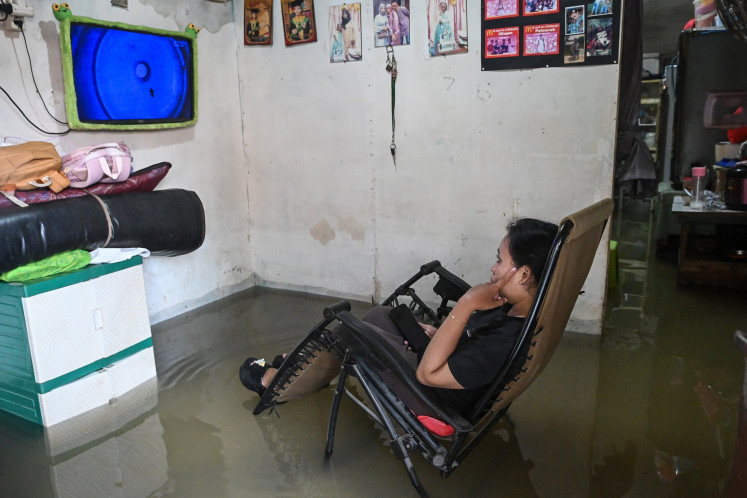Popular Reads
Top Results
Can't find what you're looking for?
View all search resultsPopular Reads
Top Results
Can't find what you're looking for?
View all search resultsCommunity embraces self-sufficient living
Growing food: A member of the self-sufficiency Doorless House Community checks vegetables on the third floor of the communityâs house in Depok, West Java
Change text size
Gift Premium Articles
to Anyone
G
span class="caption">Growing food: A member of the self-sufficiency Doorless House Community checks vegetables on the third floor of the community's house in Depok, West Java. The community has been established since 2013 and has around 30 active members. JP/Indra Budiari
Three men were digging holes at a construction site under the scorching sun in Kukusan subdistrict, Beji, Depok, West Java, when a man hopped down off his scooter and began admiring their work.
'This is going to be a great house. Many people have been anticipating this house and will move here as soon as it finishes,' said Nurcholis, a junk-store owner.
He said the construction of the house, expected to be finished within the year, would be the second for the Doorless House Community, a self-sufficient farming community that he established in 2013.
The facility, which is the second one of two, will house dozens of community members who have pledged a commitment to living sustainably by growing their own food.
The first community house was built on a 230-meter plot of land next to where the second is being built.
The first floor has an open meeting space with a reading corner comprising bookshelves, a bathroom and a small kitchen. There is also a fish pond on the first floor.
The second floor contains six bedroom which are divided from each other by plywood. There is also a rooftop that is used as a gardening area for paddy, chilies and various vegetables.
'We consume the fish and vegetables for our daily needs. However, we still have to buy rice from the market because the quantity of our paddy plants have yet to meet our needs,' Nurcholis said.
He said the 30-member community was diverse, consisting of civil servants, private company employees and university students in Greater Jakarta.
Twenty of the 30 members, including him, live in the first house. The rest were are awaiting the completion of the second house.
'In the near future, my wife and our three children will move in, too. Today, she is still taking care of my business,' he said.
He said the junk store, popularly called Rongsok Mall, could generate Rp 100 million (US$7,600) in gross income every month, and still finances the daily expenses of the community house, including a monthly electricity bill that reaches Rp 500,000.
While living for free and practicing farming may attract urban homesteading lovers, doing so requires sharing common values.
Nurcholis said members of the community believed that by having the ability to fulfill their own needs and live side by side with one another, they would be able to live in prosperity and free from conflict.
'Everyone in Jakarta, or even Indonesia, can live in prosperity if they can live in a sustainable manner. I want to live like that and invite members of this community to think the same way,' he said.
He said that besides farming together, members also gathered each evening to discuss philosophies that they strove to instill into their daily lives.
Those principles include living humbly and having a clean heart free of prejudice.
Seva Juneva Rahmanto, a student at the University of Indonesia who has lived in the first house since it was built, said he shared Nurcholis' belief that self-sufficiency was a way for people to ensure that they could fulfill their daily needs.
'This is just a start, an example. As soon as the house develops, in a year or two, there will be a lot of people who can live here without having to buy anything from outside,' Seva said.
He added that the house allowed him to practice techniques like vermicomposting, which uses earthworms to turn organic waste into high-quality compost to raise the quality of the vegetables on the rooftop.
'We are also aiming to produce our own electricity, but we still need time for that,' he said.










